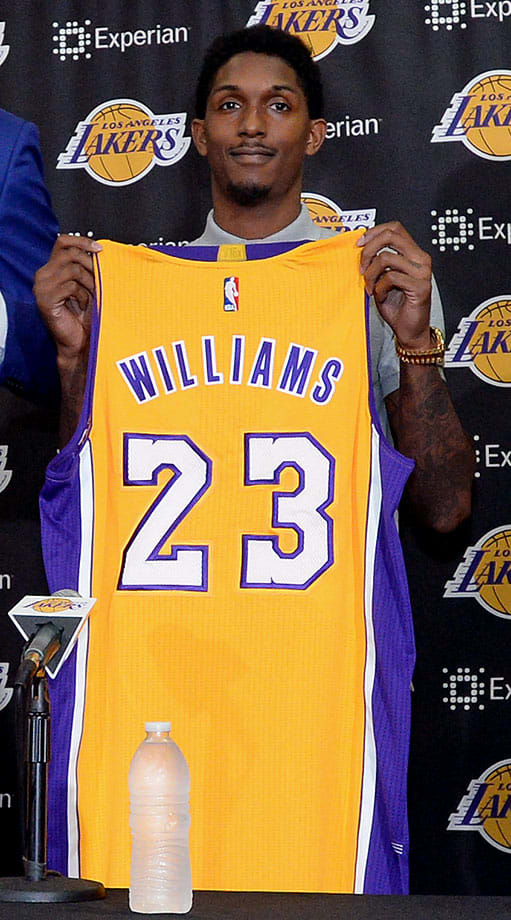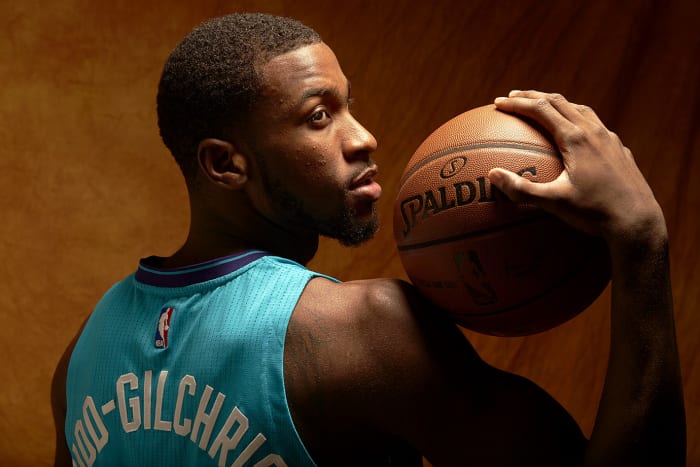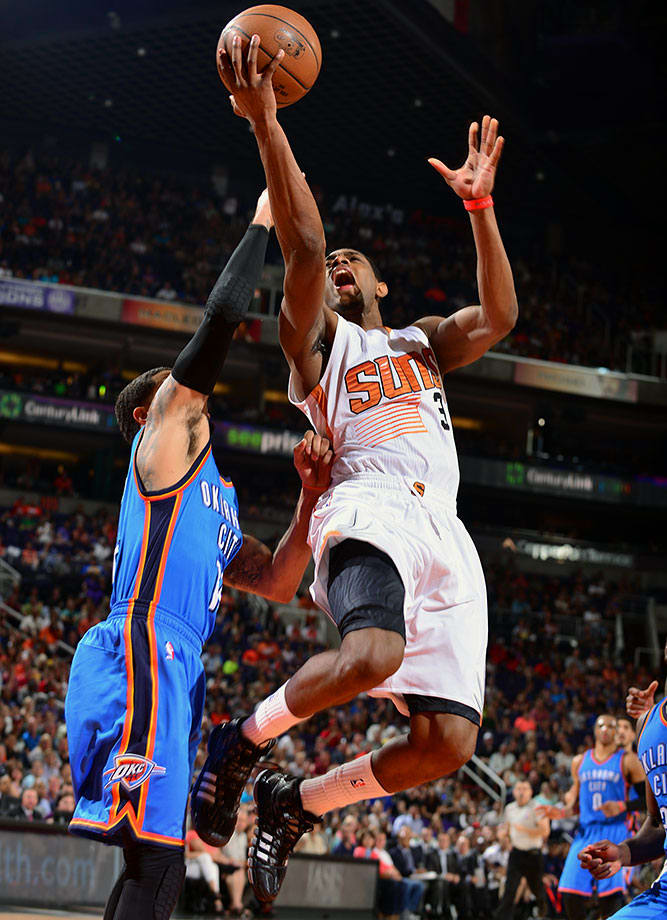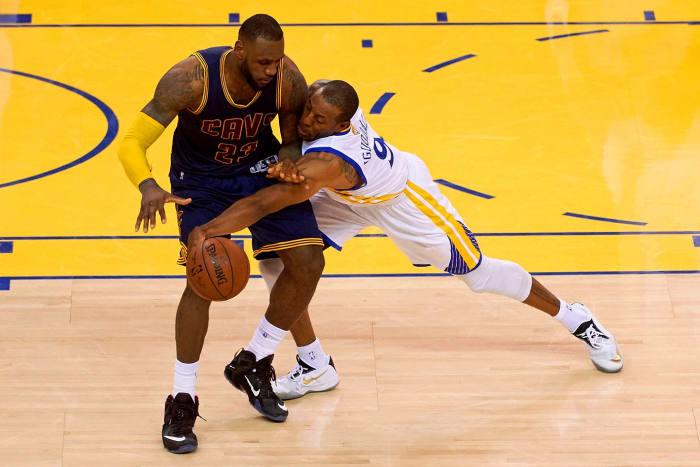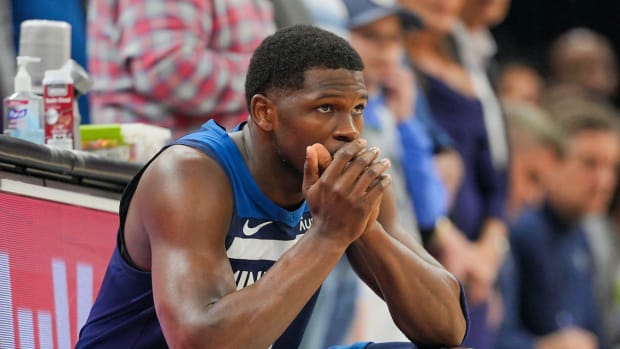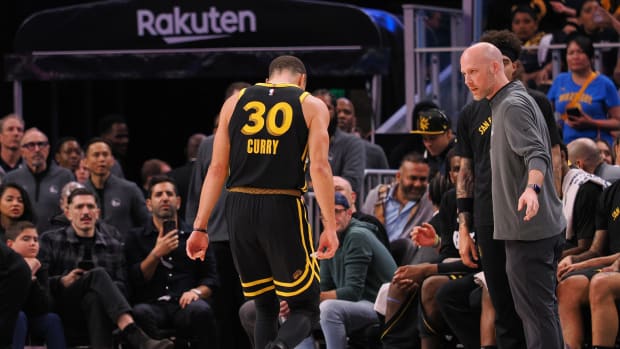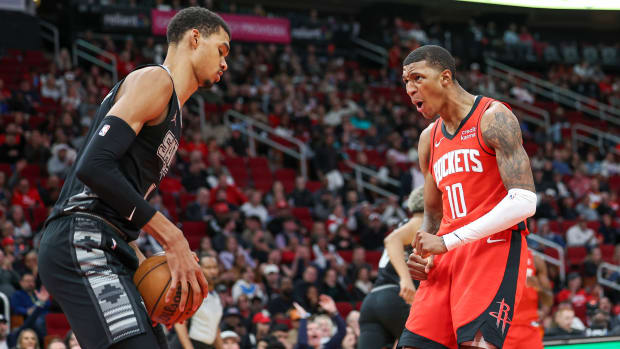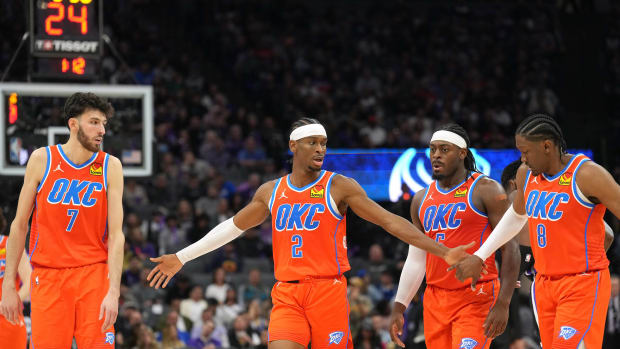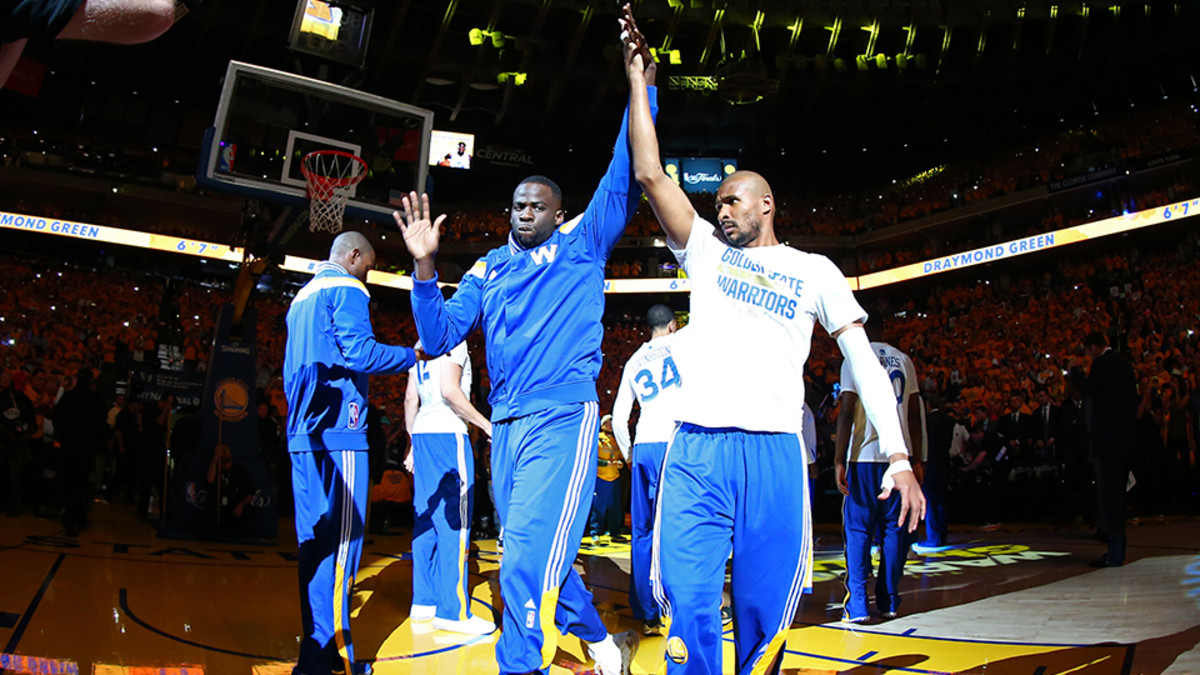
Off-season grades: Pacific Division
With most of the summer already in the books, SI.com is grading each team's off-season performance as well as examining their best and worst moves. Today, Ben Golliver breaks down the Pacific Division.
Golden State Warriors
Best move: Turning David Lee into Jason Thompson while saving millions in the process.
Worst move: Losing lead assistant Alvin Gentry to the Pelicans.
Analysis: “Boring” wasn’t a word that applied to the 2015 Warriors, who won more regular season games than any team since the 2007 Mavericks, posted the best point differential since the 2008 Celtics, and had an offense that was as electrifying and potent as anything the NBA has seen in recent memory. But, all things considered, the champs had a boring summer that lacked major surprises and was highlighted by a pair of trades that excited amateur capologists but otherwise didn’t draw much attention.
Grade the deal: Warriors lock up Draymond Green with five-year deal
Don’t confuse “boring” with “bad.” In this case, the lack of drama is owed to an early extension for Klay Thompson (reached last fall), no major unrestricted free agents, and an overwhelming desire to keep the band together after a 67-win season. The biggest questions—whether power forward Draymond Green would return and at what price—were answered on July 1, when the Defensive Player of the Year runner-up agreed to stay on a five-year, $82 million deal that looks good for both player and team. That move, coupled with the re-signing of backup guard Leandro Barbosa, ensured that Golden State will return all five starters and the top nine members of its rotation by minutes played.
The most intriguing sequence of Golden State’s summer saw Warriors GM Bob Myers trade David Lee ($15.5 million contract) to the Celtics for Gerald Wallace ($10.1 million) and Chris Babb before flipping Wallace to the Sixers for Jason Thompson (owed $6.4 million this year and $6.8 million next year) and a 2016 pick swap. Together, those trades cut Golden State’s 2015–16 payroll by $8.1 million and generated more than $20 million in luxury-tax savings without costing the Warriors a major draft asset or adding significant long-term contract obligations. Even better, Thompson is arguably a more useful player to coach Steve Kerr than Lee was, as he’s better equipped to swing up to provide minutes at center, and his smaller salary, which is only partially guaranteed for 2016–17, could potentially prove useful in a trade.
Besides Lee, who was phased out of major rotation minutes last season before making a helpful cameo in the Finals, Golden State’s biggest off-season loss was Justin Holiday. After logging a grand total of 11 postseason minutes for Golden State, the 26-year-old Holiday should be in line for a greater role in Atlanta. In truth, the departure that the Warriors might feel the most is that of Kerr’s lead assistant coach Alvin Gentry, an offensive-minded basketball lifer who will be running his own ship again for the Pelicans. The fact that both Lee and Gentry looked gone weeks, if not months, before Golden State lifted the Larry O’Brien trophy surely helped soften the blow of their exits. The Warriors might have lacked summer fireworks, but they’re still primed for their title defense.
Grade: A-
Los Angeles Clippers
Best move: Eventually re-signing DeAndre Jordan.
Worst move: Breaking up a lethal starting five by trading away Matt Barnes.
Analysis: Imagine Doc Rivers bungee-jumping off a cliff, then imagine his cord snapping once he’s halfway to the ground, then imagine him fashioning his hooded sweatshirt into a parachute that miraculously saves his life, and then imagine him discovering $200,000 cash in his pockets while everyone else is busy pointing out how unreliable bungee cords are and how close he came to death. That’s the Clippers off-season in a nutshell.
A good 90% of the analysis and 99.9% of the outrage over L.A.’s summer was directed at DeAndre Jordan, whose better-late-than-never U-turn kept the team’s championship window from shattering into a million pieces. Although Rivers played an instrumental role in re-wooing his starting center away from Dallas, that was only one portion of his busy summer. The Clippers’ president/coach totally overhauled his oft-criticized bench, adding Lance Stephenson (via trade from the Hornets) and free-agents Josh Smith, Paul Pierce, Wesley Johnson, Pablo Prigioni, Cole Aldrich, and Chuck Hayes.
• MORE NBA: Jordan parts ways with Relativity Sports agents
The Stephenson addition qualifies as high-risk/high-reward after his disastrous 2014–15 season, but the Clippers offer a defined role on a roster that is richer in talent than either of his previous stops. The Smith move deserves more love than it has received given that it represents the summer’s biggest contender-to-contender talent transfer; the mercurial forward was a clear plus for Houston last season, and he brings some badly-needed versatility to Rivers’s second-unit frontcourt, despite his obvious warts. One might quibble with giving Pierce, 37, a three-year contract or critique the other signings as being unlikely to register a real impact, but there’s nothing to hate and plenty to defend given the year-to-year pressure to finally get over the hump that looms over the franchise. The bit pieces fit logically into holes.
Although Pierce’s championship pedigree, history with Rivers, California roots, and climate-changing impact with the Wizards make him a useful addition, especially on a modest per-year salary, it would be a mistake to rush Matt Barnes out the door. Yes, Barnes is 35, he brings some personality-related baggage, and he’s clearly a complementary player at this stage of his career. Even so, he played major minutes last season, he understood what Rivers needed from him, and he was one-fifth of a Clippers starting unit that posted an obscene +17.7 net rating and drove the NBA’s No. 1 ranked offense. Any change to a unit that successful will be felt, particularly at the start of the season, regardless of how good the new model might look on paper.
With the benefit of a little space and time, L.A.’s summer appears far more productive than it seemed as it was unfolding, one emoji at a time. Retaining Jordan would have meant a successful summer by itself, and the rest goes down as gravy. Championships require both luck and skill, and Rivers’s off-season work reflects quite a bit of both. Whether his unconventional, unrepeatable process produces the desired result remains to be seen, but he enters the 2015–16 season with a roster that is markedly better than the group that fizzled out in embarrassing fashion against the Rockets.
Grade: A
Phoenix Suns
Best move: Signing an impact center in Tyson Chandler.
Worst move: Courting friction with Markieff Morris.
Analysis: The Suns are proof that it pays to share a division with the Kings and the Lakers, two of the NBA’s standard-bearers when it comes to dysfunction and drama. The long shadows cast by Vivek Ranadive and Jim Buss help hide Phoenix’s furious run of roster moves and its growing list of personality issues. Still, it’s borderline inexplicable that all of this action hasn’t produced serious media waves.
Here’s a quick recap: The Suns played hardball with Eric Bledsoe and eventually gave him big money after negotiations got fairly ugly. The Suns oversaw point guard Goran Dragic’s rise to All-NBA status, signed his brother Zoran as a nice gesture, accumulated too many other lead guards, then watched as Goran expertly leveraged his way out of town by threatening to leave as a free agent. The Suns signed scoring guard Isaiah Thomas to an excellent contract and then moved on within months. The Suns joined the Morris Twins, turned them both into productive players, signed them to nice contracts, enjoyed a victory lap in the media over those nice contracts, watched as the twins were charged with assault, traded Marcus Morris this summer without real warning, and now have to figure out what to do with an irate Markieff Morris who was fined for publicly stating that he wants out of town.
Suns' Markieff Morris: 'My future will not be in Phoenix'
Then the Suns traded a blue-chip lottery asset (a first-round pick belonging to the Lakers) for a point guard in Brandon Knight whose ceiling isn’t sky-high and who required a monster contract this summer, which they delivered. The Suns dealt with severe technical foul problems, some tension between key players and the fan base, and a DUI for P.J. Tucker. The Suns traded 2014 first-round pick Tyler Ennis (a point guard) less than one year into his career and just two seasons after giving up on 2012 lottery pick Kendall Marshall (also a point guard) before his second season. To top it all off, the Suns—minus Dragic, Thomas, Marshall, Ennis and others—are now somehow thin at point guard behind Knight. How?
Through all that, Suns GM Ryan McDonough has managed to assemble: a backcourt pairing in Knight/Bledsoe that looks promising but not yet elite; a giant looming question mark in Markieff Morris; a proven veteran center in Tyson Chandler who doesn’t really fit the same career timeline as the rest of Phoenix’s core; and a mishmash of less-proven players. Considering all of the flux and the very real potential for more in the near-future, the addition of Chandler on a four-year, $52 million contract should have a stabilizing force. A proven backline defender and lob finisher, Chandler bounced back very well from injuries that limited him in New York to help make Dallas a playoff team last year. While Chandler’s arrival should make life easier for 22-year-old center Alex Len, it’s probably asking too much to expect him to push the Suns into the playoff picture. Meanwhile, the selection of shooter Devin Booker in the draft looks like a nice long-term win, but that’s a pay-off that will almost certainly require real patience.
For now, it’s difficult to feel real enthusiasm for the 2015–16 Suns, who bear so little resemblance to the upstart group that claimed 48 victories two seasons ago. McDonough made a big deal about wanting the right type of players in his locker room after trading away Dragic and Thomas, but he’s reached the stage now where his roster is composed entirely of “his” players. When players—key players!—are coming in and going out so quickly, and many of them are seemingly irked by their experiences, McDonough and his front office can’t reasonable pin all of the animosity on the exiting parties. One acrimonious split might say something about your former significant other. Five such splits says something about you too.
It’s possible that the Knight/Bledsoe/Chandler triumvirate outpaces expectations and temporarily slows this never-ending churn, but that’s hardly a guarantee considering the competition in the West, Chandler’s age, and the yet-to-be-determined chemistry between Knight and Bledsoe. Both Utah and New Orleans are more intriguing as rising members of the conference’s middle tier, leaving Phoenix staring at the real possibility that all of its recent activity will leave it on the outside looking in come late-April. Again.
Grade: C+
Sacramento Kings
Best move: Inking Kosta Koufos to a four-year deal.
Worst move: Taking the plunge with Rajon Rondo.
Analysis: Anyone who claims, with certainty, to know how Sacramento will fare in 2014–15 is a flat-out, doggone liar. Not even Ken Kesey and the Merry Pranksters could have imagined a trippier roster than the Kings, which now includes a Boogie, a Belly, a Trill, and a Tuff Juice. The sheer volume of unusual circumstances—a rash owner in Vivek Ranadive, a rookie executive in Vlade Divac, a stubborn coach in George Karl, a volatile and promising All-Star center in DeMarcus Cousins, a promising but unpolished rookie in Willie Cauley-Stein, and a point guard in desperate need of redemption in Rajon Rondo—makes pinpointing a specific win total an exercise in futility. Expecting anything above .500 would be asking an awful lot from a team that hasn’t cracked 30 wins since 2008, but that still leaves open a wide range of possibilities, doesn’t it?
• MORE NBA: Rondo among players in critical contract year
In sum, Sacramento’s signings of Rondo, Kosta Koufos, and Marco Belinelli appear borne of impatience, especially given reports of the Kings’ other misses in free agency. Rondo arrives on a one-year, $10 million contract that is unfriendly in every way to the Kings: it’s too much to pay for a limited player who walked out on his team during the playoffs, and it doesn’t provide any future control if Rondo does somehow manage to return to his past All-Star form. The fit is as questionable as the deal terms, given the potential for a power struggle between Rondo and Karl, and the clear role conflict between Rondo and incumbent starter Darren Collison. Belinelli, meanwhile, does bring some much-needed shooting and extensive postseason experience, but he is accustomed to playing in space and with plenty of willing passers. Both of those could be in short supply in Sacramento.
Koufos’s arrival on a four-year, $33 million deal looks like the best of the bunch. Although the 7-footer will either back up Cousins or play alongside him in a cramped frontcourt pairing, he represents good value at his new contract number and is a dependable, unselfish producer. How, exactly, Karl decides to split minutes between Cousins, Koufos, and the defense-first Cauley-Stein remains to be seen. That conundrum is only complicated by the possibility of small ball looks featuring Rudy Gay or Omri Casspi. Regardless, it never hurts to have an extra big man around. Sacramento learned that lesson the hard way when Cousins missed time with viral meningitis, an absence that sent the entire franchise reeling and led to changes on the coaching staff and in the front office.
The Incredible Journey of Seth Curry
The sense, after all of these somewhat bizarre moves, is that Sacramento has upgraded its short-term talent base. Any excitement that statement might create should be tempered with the knowledge that this group still faces major, major lineup and personality questions. What’s more, this modest personnel upgrade came with a significant additional cost, in the form of a cap-clearing trade with Philadelphia that looks like one of the most lopsided deals in recent NBA history. In that move, Sacramento parted with Nik Stauskas (a 2014 lottery pick with greater long-term potential than Belinelli), a first-round pick, and a pick swap for the right to dump the contracts of Carl Landry and Jason Thompson. The terms of the deal raised a hellish question: Will Sacramento’s mortgaged future manage to be worse than its messy recent past?
Grade: C-
Los Angeles Lakers
Best move: Buying low on Roy Hibbert.
Worst move: This press conference.
Analysis: The 2015 off-season was another total failure for the Lakers, if judged by the franchise’s “championship-or-bust” mentality. Jim Buss, Mitch Kupchak and company not only failed to land an A-list free agent or even a B-list free agent, just like last summer, they reportedly left LaMarcus Aldridge so confused during their first sitdown with the All-Star power forward that they had to ask for a do-over meeting. Every diehard Lakers fan read that sentence and immediately fired up a Google search to see how much longer the team must stink before Buss honors his promise to step down.
“Total failure” or not, this summer definitely could have been worse. For starters, No. 2 overall pick D’Angelo Russell brings some much-needed hope and long-term direction. Before Russell, the Lakers weren’t in position to do anything except milk Kobe Bryant’s twilight for everything that it was worth. With Russell, the Lakers can begin to imagine a post-Bryant core that might pair the Ohio State product with Jordan Clarkson, Julius Randle and others. That’s a real step forward.
Taking a chance on former Pacers center Roy Hibbert was a worthwhile gamble too. Acquiring Hibbert, who will earn $15.5 million next year in the final year of his contract, cost only unused cap space and a minor draft asset. The inconsistent, lumbering center addresses a major roster weakness: interior defense. Hibbert might not be good enough to single handedly fix a Lakers defense that ranked No. 29 last season, but he brings his signature rim protection to a rotation that’s chockfull of minus defenders. Given that testing out Hibbert required no long-term financial commitment, the Lakers deserve credit for making a nice buy-low play.
L.A.’s biggest financial outlay went to Lou Williams, who secured a three-year, $21 million contract after taking home 2015 Sixth Man of the Year honors. The 28-year-old shoot-first guard makes for a strange fit alongside gunners like Bryant and Nick Young, but his contract terms are reasonable and he can help initiate some of the offense as Russell and Clarkson develop. After parting with the likes of Ed Davis, Jordan Hill, Jeremy Lin, Wayne Ellington, Carlos Boozer, Wesley Johnson and Ronnie Price, the Lakers’ only remaining “name” addition this summer was Brandon Bass, a complementary power forward who really isn’t a game-changer.
Just like last year, the Lakers struck out and then punted. It goes without saying that Hibbert, Williams and Bass aren’t really supposed to lift the Lakers back into the playoff picture. Their memorable introductory press conference, which produced total silence when the trio was asked if they had heard from Bryant, said it all. This group isn’t designed to win, there’s no reason to believe it will accidentally win, and it might be better off losing big (again) so that the franchise gets to keep its lottery pick rather than conveying it to the Sixers (again).
That press conference’s uncomfortable silence reflects a team-wide purgatory created by Bryant’s decline: as long as Bryant hangs on with coach Byron Scott’s help, the youngsters can’t really get a jump on the future and the front office can’t truly compete for franchise-changing talents in the summer. Assuming this is Bryant’s swan song, and that’s still just speculation, there should be brighter days coming in 2016 and 2017. As for this summer, the Lakers might not have turned things around, but at least they didn’t dig the hole any deeper.
Grade: C
Top 100 NBA Players of 2016
#100 — Giannis Antetokounmpo
#99 — Wesley Matthews
#98 — Donatas Motiejunas
#97 — Nerlens Noel
#96 — Josh Smith
#95 — Roy Hibbert
#94 — Reggie Jackson
#93 — J.J. Redick
#92 — Lou Williams
#91 — Andrew Wiggins
#90 — Taj Gibson
#89 — Amir Johnson
#88 — Isaiah Thomas
#87 — Ricky Rubio
#86 — Kenneth Faried
#85 — Michael Kidd-Gilchrist
#84 — Robin Lopez
#83 — Deron Williams
#82 — Joe Johnson
#81 — DeMarre Carroll
#80 — George Hill
#79 — Brandon Knight
#78 — Tobias Harris
#77 — Jonas Valanciunas
#76 — Andrew Bogut
#75 — Thaddeus Young
#74 — Tiago Splitter
#73 — Danilo Gallinari
#72 — Ryan Anderson
#71 — Paul Pierce
#70 — Tristan Thompson
#69 — Hassan Whiteside
#68 — Timofey Mozgov
#67 — Nikola Vucevic
#66 — Chandler Parsons
#65 — Trevor Ariza
#64 — Markieff Morris
#63 — Marcin Gortat
#62 — Bradley Beal
#61 — DeMar DeRozan
#60 — Derrick Rose
#59 — Jrue Holiday
#58 — Tyreke Evans
#57 — Monta Ellis
#56 — Luol Deng
#55 — Nicolas Batum
#54 — Kobe Bryant
#53 — Tony Parker
#52 — Rudy Gay
#51 — Ty Lawson
#50 — Danny Green
#49 — Zach Randolph
#48 — Greg Monroe
#47 — Al Jefferson
#46 — Kyle Korver
#45 — Khris Middleton
#44 — Andre Iguodala
#43 — Joakim Noah
#42 — Goran Dragic
#41 — Jeff Teague
#40 — Pau Gasol
#39 — Rudy Gobert
#38 — Brook Lopez
#37 — Derrick Favors
#36 — Tyson Chandler
#35 — Andre Drummond
#34 — Kyle Lowry
#33 — Eric Bledsoe
#32 — Paul Millsap
#31 — Gordon Hayward
#30 — Dwyane Wade
#29 — DeAndre Jordan
#28 — Dirk Nowitzki
#27 — Mike Conley
#26 — Klay Thompson
#25 — Serge Ibaka
#24 — Damian Lillard
#23 — Kyrie Irving
#22 — Chris Bosh
#21 — Al Horford
#20 — Paul George
#19 — Dwight Howard
#18 — Jimmy Butler
#17 — Kevin Love
#16 — Draymond Green
#15 — Carmelo Anthony
#14 — DeMarcus Cousins
#13 — John Wall
#12 — LaMarcus Aldridge
#11 — Tim Duncan
#10 — Kawhi Leonard
#9 — Marc Gasol
#8 — Blake Griffin
#7 — Russell Westbrook
#6 — Chris Paul
#5 — James Harden
#4 — Stephen-Curry
#3 — Anthony Davis
#2 — Kevin Durant
#1 — LeBron James








































